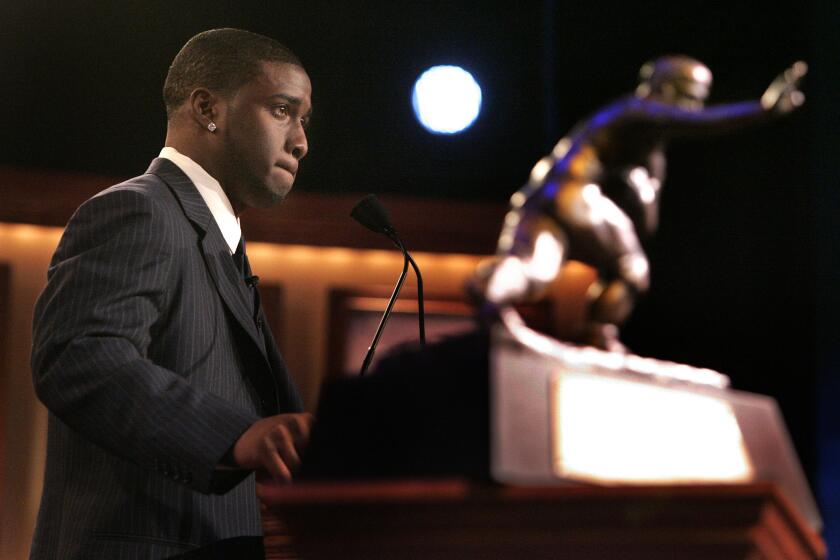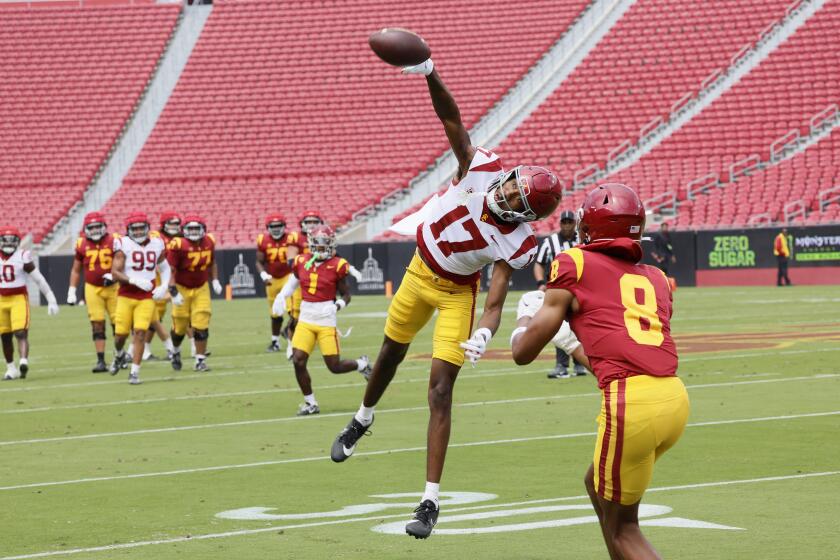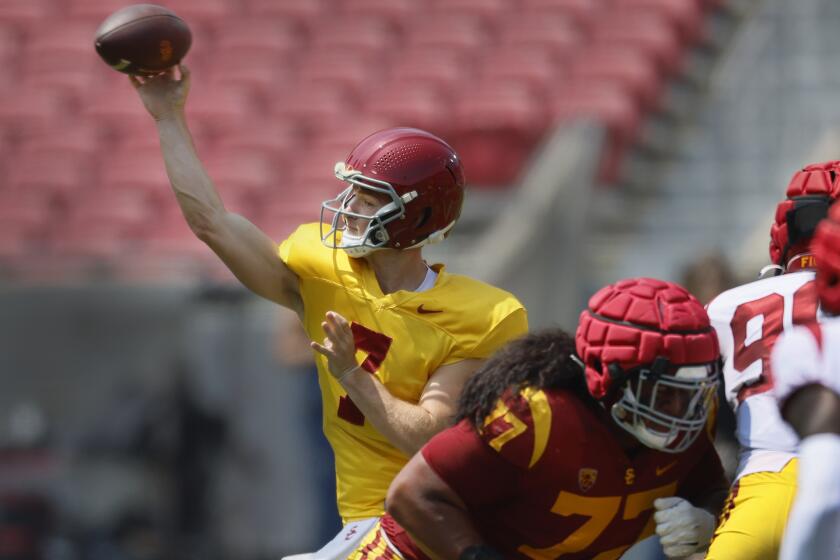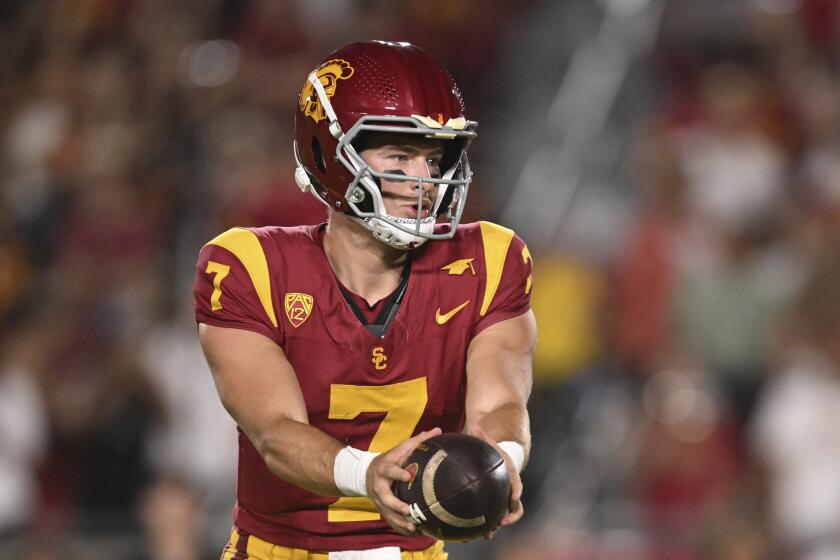He’s There in Bad Times
A few days after USC linebacker Rey Maualuga was arrested on suspicion of punching a man at a party last week, a familiar name appeared in the news.
Carmen Trutanich.
In the last year or so, the Southern California attorney has represented four Trojan football players -- tailback Hershel Dennis, former cornerback Eric Wright, former defensive lineman Manuel Wright and now Maualuga.
The stout, personable USC alumnus has worked as a prosecutor for the district attorney’s office and, last summer, was hired by the city attorney to represent the Coliseum Commission in its dealings with the NFL.
As an attorney in private practice, Trutanich has no official connection to USC football, but team officials have referred players to him often enough that, last spring, the NCAA and Pacific 10 Conference investigated.
The 54-year-old man known as “Nuch,” while declining to comment with Maualuga’s case pending, has spoken previously of his work with USC athletes and, he says, some who played for other colleges.
“I hope no one else gets in trouble,” he told The Times in April. “But I hope that anybody who gets in trouble calls me.... The bottom line is that I think I’ve done a great job representing student-athletes.”
Asked about Trutanich, Coach Pete Carroll said: “He’s part of the [USC] community. Somebody has to represent these guys.”
*
In his early days as a college assistant, Carroll recalls, former coach Lou Holtz warned him to expect four or five crises each season, on and off the field.
Since his arrival at USC in 2001, at least seven of Carroll’s players and a recruit have come under law enforcement scrutiny, including the four represented by Trutanich.
Last spring, police arrested Eric Wright on suspicion of felony sexual assault and, according to documents, found 136 Ecstasy pills in an apartment he shared with a teammate. In August 2004, Dennis was the focus of a sexual-assault investigation.
Authorities did not find sufficient evidence to charge either man. Dennis remains with the team. Wright transferred to Nevada Las Vegas.
Also in 2004, Trutanich took over the case of Manuel Wright, who had been convicted of misdemeanor battery before entering the university the year before and was summoned back to court for failing to comply with his probation.
Wright’s father, Terence, said he would recommend the attorney to anyone who needed legal help. But before Trutanich gets involved, the first step for any USC player is to check a laminated card provided by the team.
On one side are phone numbers for Dennis Slutak, director of football operations, and head trainer Russ Romano. On the other side are numbers for team security coordinators Xavier Suazo and Rick Carr.
Known as “X-Man,” Suazo is a former state Justice Department agent who arranges police escorts for team buses and knows whom to contact at local agencies when a player is arrested.
Players are instructed to call Slutak first.
“It gives us a chance to make sure that a guy doesn’t make the wrong step or take the wrong stand on things,” Carroll said.
For example, a witness said Maualuga fled the Halloween night party after his alleged incident. But after a teammate at the scene called Slutak, Maualuga showed up at the Los Angeles Police Department’s Southwest Division hours later. By Friday, he had met with Trutanich.
After an incident, Suazo usually briefs coaches on what happened and what comes next. Details can be hard to come by.
As of Tuesday, Carroll said he had yet to receive any information on Maualuga’s misdemeanor battery case from the LAPD or university police.
According to Carroll, when the facts are eventually gathered, punishment is debated by coaches and a players’ committee. It could range from extra running to expulsion from the program.
“I don’t want to make a decision from some tower, without knowing what happened,” Carroll said. “We try to put it all together.... What does this all mean?”
*
In worst-case scenarios involving an arrest, players often must post bail. That entails submitting the entire cash amount to the court or paying 10% to a bondsman.
Maualuga was released on his own recognizance, which is common in misdemeanor cases and does not require bail.
NCAA rules allow coaches to suggest an attorney and even call on a player’s behalf, as long as the call does not result in special treatment, such as reduced legal fees, an NCAA spokesman said.
Dennis said that when he came under investigation, former director of football operations Mark Jackson gave him Trutanich’s name.
“It was really scary,” the tailback said. “I called [Trutanich], and he was up here that day.”
The incident involved a woman who attended a gathering at an off-campus apartment and later reported that she had been sexually assaulted. Dennis, suspended from the team for having a woman in his apartment during training camp, met regularly with Trutanich.
“I was just sitting at home, not knowing what was going to happen,” Dennis said. “Carmen told me, ‘If you didn’t do anything wrong, don’t worry.’ He took care of me.”
The player was reinstated by mid-September and, in December, prosecutors announced that “evidence collected does not lead to the conclusion that any criminal activity occurred.”
When Eric Wright got into trouble the following March, Dennis advised him to call Trutanich, saying: “You’re in good hands.”
*
Shortly after Eric Wright’s case hit the news, the NCAA and Pac-10, working through USC, began an investigation into possible rules violations.
Trutanich said he told authorities that Dennis and Wright had contacted him themselves, signed standard retainer agreements and paid for their legal services.
“I am a for-profit corporation,” he told The Times. “I do not plan on going broke.”
Dennis also said that he paid the attorney, and the investigation has resulted in no action by authorities.
“Bottom line is, I’m not stupid,” Trutanich said. “I know what the rules are. I’m not going to risk my career.”
According to a profile listed on the website for the Trutanich Michel law firm, Trutanich earned a bachelor’s degree in business from USC in 1973 and a master’s of business administration in 1978. He studied law at Northrop College of Law.
As a member of the district attorney’s office, Trutanich helped form the environmental crimes division and became known as a specialist in that area of law.
Five years ago, however, he made headlines in a very different kind of case. As a young prosecutor, he had once been fired upon by a carload of gang members at a South-Central murder scene. A district attorney’s investigator had pulled him to safety.
In 2000, that same investigator was injured by Santa Monica police officers who mistook him for a unemployment-check fraud suspect. Trutanich represented him in court and won a $1.8-million decision.
The case was, Trutanich told a reporter, repayment for an old debt.
As an active member of the San Pedro community, Trutanich has raised money for local charities and become embroiled in more controversial matters, especially regarding development at the port.
He made a campaign contribution last summer of more than $5,000 in support of City Atty. Rocky Delgadillo, and his law firm holds dinners at Papadakis Taverna, owned by the family of former USC players John, Taso and Petros Papadakis.
Around USC, Trutanich’s representation of Trojan players has made him a familiar presence. At the season opener in Hawaii, he lingered near the team bus after a walk-through practice and was warmly greeted by Carroll.
However, the lawyer said he has yet to attend any other games this season and his connection to the program goes only so far. In April, he quipped: “My son applied to USC law school and didn’t get in.”
“I’m a lawyer. I defend people who get in trouble,” he said. “This is no different than what I do on a daily basis.”
Go beyond the scoreboard
Get the latest on L.A.'s teams in the daily Sports Report newsletter.
You may occasionally receive promotional content from the Los Angeles Times.





